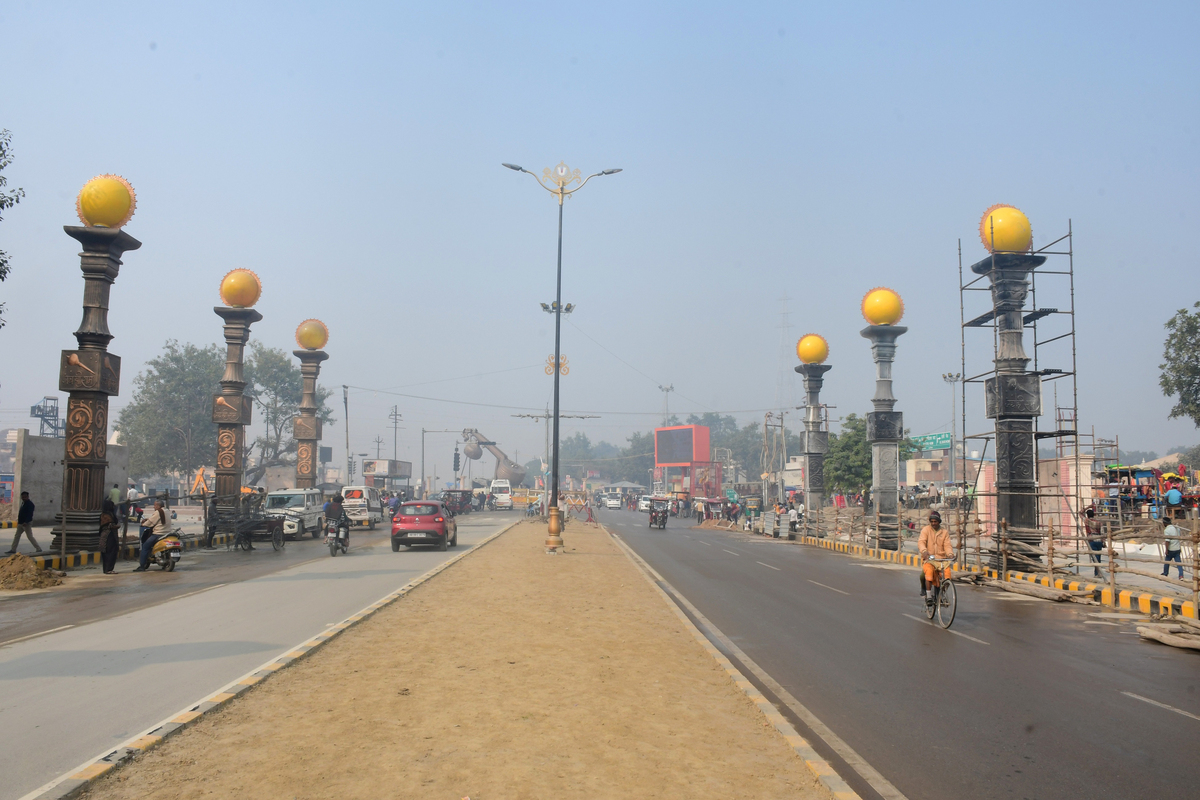PM likely to visit Mahakumbh on February 5, President on February 10
Prime Minister Narendra Modi is likely to visit Mahakumbh Mela 2025 on February 5 while President Drapudi Murmu is expected to visit here on February 10.
Many projects will be inaugurated along with the airport, railway station, highway and railway line doubling. Four major roads will also be inaugurated.

Ayodhya (ANI Photo)
Ahead of the consecration ceremony of Ram Lalla Temple at Ayodhya, Prime Minister Narendra Modi is set to embark on a visit to Ayodhya on December 30, during which he will inaugurate various projects worth Rs 15 thousand crore to Ayodhya.
Many projects will be inaugurated along with the airport, railway station, highway and railway line doubling. Four major roads will also be inaugurated.
Advertisement
Uttar Pradesh Chief Minister Yogi Adityanath is taking stock of the preparations of security arrangements before the Prime Minister’s visit.
Advertisement
PM Modi will also inaugurate the Ayodhya Dham Junction Railway Station, a significant milestone in the government’s commitment to enhancing infrastructure and connectivity.
The Ayodhya Dham Junction Railway Station, developed at a cost exceeding Rs 240 crore, boasts a modern three-storey building equipped with state-of-the-art facilities such as lifts, escalators, food plazas and child care rooms. Notably, the station is ‘accessible for all’ and has been certified as a green station building by the Indian Green Building Council (IGBC).
It is pertinent to note that the Prime Minister’s vision for Ayodhya extends beyond the railway station. At approximately 11:15 AM, he will flag off the Amrit Bharat trains, introducing a new category of superfast passenger trains in the country. The Amrit Bharat Express, an LHB push-pull train with non-air-conditioned coaches, promises an enhanced passenger experience with improved amenities including attractive seat designs, better luggage racks, mobile charging points, LED lights, CCTV and a public information system.
PM will inaugurate two Amrit Bharat trains, which are Darbhanga-Ayodhya-Anand Vihar Terminal Amrit Bharat Express and Malda Town-Sir M. Visvesvaraya Terminus (Bengaluru) Amrit Bharat Express. Additionally, six new Vande Bharat Trains will be flagged off, contributing to the nation’s rail network. The Vande Bharat Express trains include routes such as Ayodhya-Anand Vihar Terminal, Shri Mata Vaishno Devi Katra-New Delhi, Amritsar-Delhi, Coimbatore-Bangalore Cantt, Mangalore-Madgaon and Jalna-Mumbai.
In a comprehensive move to bolster rail infrastructure in the region, the Prime Minister will dedicate three railway projects worth Rs 2300 crore. The projects include the Rooma Chakeri-Chanderi third line project; Jaunpur-Tulsi Nagar, Akbarpur-Ayodhya, Sohawal-Patranga and Safdarganj-Rasauli sections of the Jaunpur-Ayodhya-Barabanki doubling project; and doubling and electrification project of the Malhaur-Daliganj railway section.
Modi’s Ayodhya visit also includes the inauguration of the newly built Ayodhya Airport and participation in a public program where the Prime Minister will dedicate numerous development projects worth more than Rs 15,700 crore in the state, aligning with his vision to create modern, world-class infrastructure while preserving Ayodhya’s rich history and heritage. These include projects worth about Rs 11,100 crore for the development of Ayodhya and its surrounding areas and projects worth about Rs 4600 crore related to other projects across Uttar Pradesh.
Additionally, the Prime Minister will also initiate the development and beautification of tourist facilities spanning from Naya Ghat to Laxman Ghat, the construction of a visitor gallery for events like Deepotsav and the strengthening and renovation of the pilgrim path from Ram Ki Paidi to Raj Ghat and Raj Ghat to Ram Temple.
An ambitious greenfield township, valued at over Rs 2180 crore and the Vashishtha Kunj Residential Scheme, with an estimated cost of around Rs 300 crore, will also launch, promising a significant boost to Ayodhya’s urban landscape.
Furthermore, PM Modi will lay the foundation stone of infrastructure projects, including the Lucknow-Ayodhya section of NH-28 (new NH-27), modification of the existing Ayodhya bypass, the establishment of the CIPET centre, and the construction of offices for the Municipal Corporation Ayodhya and Ayodhya Development Authority.
The development momentum extended beyond Ayodhya, with the Prime Minister inaugurating and dedicating several key projects across Uttar Pradesh. These encompass the four-lane widening of Gosain Ki Bazar Bypass-Varanasi (Ghaghra Bridge-Varanasi) (NH-233), the strengthening and upgradation of the Khutar to Lakhimpur section of NH-730, and capacity enhancement of the LPG plant in Trishundi, Amethi district, Sewage Treatment Plant of 30 MLD in Pankha and 130 MLD in Jajmau, Kanpur; interception and diversion of drains and sewage treatment work in Unnao district; and CETP for Tannery Cluster at Jajmau in Kanpur.
These initiatives and the Prime Minister’s proactive approach towards development aim to propel Ayodhya and Uttar Pradesh into a new era of growth and prosperity, setting the stage for a brighter future for the region.
Advertisement